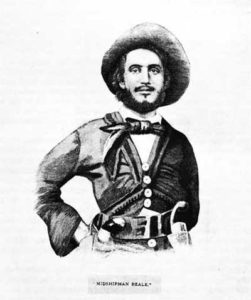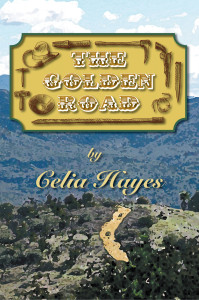Edward Fitzgerald “Ned” Beale was a prominent 19th century hero, a celebrity, almost; a military officer, war hero, notable horseman and explorer, hero of the western frontier, good friend of several other notable frontiersmen, friend of one president, and appointed to offices of responsibility by four others – and those offices varied quite widely in scope. He was also a champion of the Native American tribes, prominent in Washington high society for decades, and seemed to lurk meaningfully in the background of key historical events at mid-19th century. Curiously, his name doesn’t readily spring to mind more than a hundred years after his death; the most prominent places bearing his name being Beale Street in San Francisco, and Beale Air Force Base, near Marysville in north-central California. One would think for all his various services to the nation and for his vast array of prominent and still-famous friends that he would be more of a household name. Perhaps he was for a while – but four decades or more of politically-correct restructuring of American history have elevated some, and reduced others to mere footnotes in dusty journals.

Beale as a young midshipman
Beale’s next assignment for Stockton was – not to put too fine a point on it – a spy, ordered to conceal his nationality and sail on a Danish ship to England, to suss out British feelings and possible war preparations over the contentious matter of the Oregon boundary. Barely having completed that assignment and reported his findings to President Polk, Beale was sent off hotfoot with dispatches to rejoin Captain Stockton, whose flagship happened to be in Peru at that moment. This necessitated that Beale make the journey by sea to Panama, cross the Isthmus and make his way to Peru – all this a kind of 19th century precursor to Planes, Trains and Automobiles.
Stocktons’ ship detoured to Hawaii, and arrived in harbor at Monterey, California in July, 1846. War between the United States and Mexico had already begun. The Pacific Squadron’s orders, in that eventuality, were to seize those ports along the Pacific coast – especially those in California. Stockton set about doing so with zeal and efficiency. Ned Beale was detached to serve with a US Army column which had come at speed overland from Fort Scott on the Missouri-Mississippi under the command of General Stephen Kearny. Briefly pausing to take Santa Fe, and New Mexico for the US, Kearney’s advanced column – guided by Kit Carson — arrived in California out of breath and weakened after a marathon march of 2,000 miles across country. Kearney’s advance party, augmented with sailors and Marines from the Pacific Squadron clashed with Californio-Mexican volunteers and Mexican presidial cavalry at San Pasqual, near San Diego. Both sides claimed a victory – although Kearney’s force suffered the heavier losses, they eventually took San Diego, and Ned Beale was one of the heroes. Two months after the San Pasqual fight, he was sent east with dispatches. Over the next two years, he made six cross-continental journeys on official business; one of them in disguise to make a short-cut through Mexico to bring irrefutable proof of the tremendous gold strike in the California foothills at Coloma to the federal government. Amid these expeditions, he found the time and energy to marry; the daughter of a politician from Pennsylvania, Mary Edwards, and sire three children with her.
Beale resigned his naval commission in 1851, but in no way was he done with the far west, or assignments of great import to the federal government. He returned briefly to California, to manage properties owned there by his mentor, Commodore Stockton. On his way west, he squeezed in a spot of surveying for a transcontinental rail line through present-day Colorado to Los Angeles. Two years later, he was appointed superintendent of Indian affairs in California and Nevada. Thereafter Ned Beale spent a hectic decade exploring and surveying the west, establishing a wagon road between Fort Defiance, New Mexico to a point on the Colorado River between Arizona and California – the initial phase of this project involved another project of interest to the Army – the Camel Corps. He proved to be a champion of camels in the far west; when the Camel Corps was formally disbanded at the end of the Civil War, Beale purchased some of the surplus camels and kept them at his vast California ranch property. The camels also served in a later Beale expedition to extend the road from Fort Smith, Arkansas, to the Colorado River. That same route was later followed by the Santa Fe railway, US Route 66 and the present day I-40.
In 1871, Ned Beale purchased a mansion in Washington, DC – Decatur House, notable for being almost next-door to the White House, and entertained a wide variety of guests there over the following years – guests including U. S. Grant, and prominent members of his administration. He spent one year as ambassador to Austria-Hungary, and made as much of a social splash in Vienna as he had in Washington. Doubt less his experiences on the far-west frontier – which by that point was almost legendary – coupled with his considerable diplomatic skills and ability to earn the trust of important people had a lot to do with that success.
His final years were spent between Decatur House, the California ranch, and a horse farm called Ash Hill, close to Washington. He died at Decatur House in 1893, a few years shy of the twentieth century. Sailor, soldier, spy, surveyor, explorer, diplomat, rancher, man about town – and a fine judge of horseflesh. Not many men of his time could quite equal that resume in every particular.
(Ned Beale is set to appear as a character in the next Lone Star Sons book – Lone Star Glory, which I hope to bring out by November, 2017.)

 ring those copies for a holiday special:
ring those copies for a holiday special:
Recent Comments